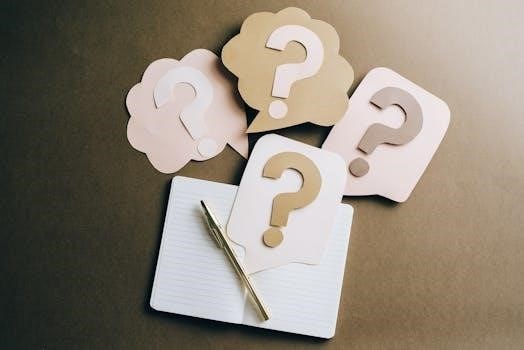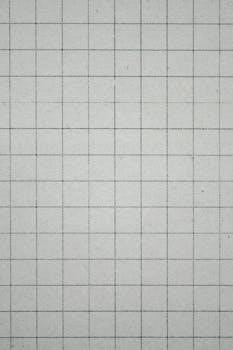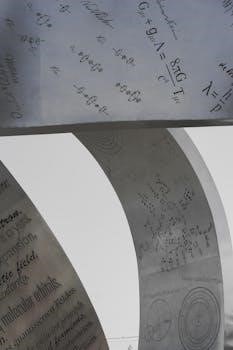Math Olympiad questions are challenging problems designed to test mathematical intuition‚ problem-solving skills‚ and creativity. They often require innovative approaches‚ going beyond standard curriculum knowledge. These questions span various mathematical fields and are used in competitions like the IMO‚ pushing participants to excel. Solving them develops critical thinking.
Importance of Math Olympiad Preparation
Preparing for Math Olympiads offers numerous benefits extending far beyond competition success. It cultivates a deep understanding of mathematical principles by encouraging students to explore topics in greater depth. This rigorous training enhances problem-solving abilities‚ fostering analytical and critical thinking skills applicable across various disciplines. Olympiad preparation promotes creativity‚ as students learn to approach problems from multiple angles and devise innovative solutions.
Furthermore‚ it builds resilience and perseverance. Tackling challenging problems requires dedication and the ability to learn from mistakes. Students develop effective study habits‚ time management skills‚ and the ability to work independently. Exposure to advanced mathematical concepts broadens their intellectual horizons and prepares them for higher education in STEM fields. Participating in Olympiads also provides a platform for networking with like-minded individuals‚ fostering a sense of community and collaboration.
Ultimately‚ Math Olympiad preparation is an investment in intellectual growth‚ fostering a lifelong love for mathematics and equipping students with invaluable skills for future success.

Types of Math Olympiad Problems
Math Olympiad problems typically encompass algebra‚ geometry‚ number theory‚ and combinatorics. Algebra problems involve equations and inequalities. Geometry problems explore spatial relationships. Number theory delves into integers and divisibility. Combinatorics focuses on counting and arrangements. Each category demands unique problem-solving strategies.
Algebra Problems
Algebra problems in Math Olympiads often extend beyond routine equation solving. They frequently involve intricate algebraic manipulations‚ clever substitutions‚ and a deep understanding of algebraic structures. These problems may require proving inequalities‚ solving functional equations‚ or finding integer solutions to polynomial equations. A solid foundation in algebraic identities‚ factorization techniques‚ and the theory of equations is essential.
Olympiad-level algebra problems often demand creative problem-solving approaches and the ability to recognize hidden patterns. They might involve advanced concepts like Vieta’s formulas‚ generating functions‚ or the application of algebraic inequalities such as AM-GM or Cauchy-Schwarz. Successful problem-solvers must be adept at transforming complex expressions into more manageable forms and applying algebraic principles in innovative ways.
Furthermore‚ understanding the properties of different number systems‚ including real and complex numbers‚ is crucial for tackling these challenges. Proficiency in manipulating radicals‚ exponents‚ and logarithms is also frequently required. Ultimately‚ excelling in algebra problems in Math Olympiads necessitates a blend of technical skill and creative thinking‚ allowing participants to approach seemingly intractable problems with confidence and ingenuity.
Geometry Problems
Geometry problems in Math Olympiads are a staple‚ renowned for their elegance and the creative insights they demand. They often involve intricate diagrams and require a strong understanding of geometric theorems‚ properties‚ and constructions. These problems might ask for the calculation of areas or volumes‚ the proof of collinearity or concurrency‚ or the determination of geometric loci.
Success in Olympiad geometry hinges on a deep familiarity with classical theorems such as the Pythagorean theorem‚ Thales’ theorem‚ and Ceva’s theorem. Mastery of angle chasing‚ similarity‚ and congruence is also essential. However‚ the most challenging problems often require the introduction of auxiliary lines‚ circles‚ or points to reveal hidden relationships and unlock the solution.
Furthermore‚ a solid understanding of trigonometry and coordinate geometry can provide powerful tools for tackling geometric challenges. The ability to translate geometric conditions into algebraic equations or trigonometric identities can often simplify complex problems. Ultimately‚ excelling in geometry problems in Math Olympiads necessitates a blend of spatial reasoning‚ geometric intuition‚ and a willingness to explore different approaches to find the most elegant and insightful solution.
Number Theory Problems
Number theory problems are a cornerstone of Math Olympiads‚ celebrated for their deceptively simple statements that often conceal profound depths. These problems delve into the properties of integers‚ exploring concepts like divisibility‚ prime numbers‚ modular arithmetic‚ Diophantine equations‚ and number sequences. They require a strong foundation in fundamental number theory principles and the ability to apply them creatively.
Common techniques used in solving number theory problems include factorization‚ the Euclidean algorithm‚ Fermat’s Little Theorem‚ and the Chinese Remainder Theorem. Understanding the properties of prime numbers and their distribution is crucial. Many problems involve proving divisibility relationships‚ finding solutions to Diophantine equations (equations with integer solutions)‚ or analyzing the behavior of sequences of numbers.
Beyond basic knowledge‚ success in number theory demands ingenuity and a willingness to experiment. Often‚ clever manipulations‚ insightful observations about numerical patterns‚ or the application of modular arithmetic can unlock seemingly intractable problems. Number theory problems cultivate rigorous logical thinking and the ability to construct elegant and concise mathematical arguments‚ making them a valuable component of Math Olympiad preparation.
Combinatorics Problems
Combinatorics problems in Math Olympiads explore the art of counting and arrangement‚ dealing with permutations‚ combinations‚ graph theory‚ and discrete probability. These problems often involve determining the number of ways to arrange objects‚ selecting items from a set‚ or proving the existence of certain configurations.
Key concepts in combinatorics include the multiplication principle‚ binomial coefficients‚ inclusion-exclusion principle‚ and recurrence relations. Graph theory problems may involve analyzing networks‚ finding paths‚ or determining properties of graphs. Discrete probability problems require understanding probability in finite sample spaces and applying counting techniques.
Solving combinatorics problems demands careful attention to detail and the ability to identify underlying patterns. It often involves breaking down a complex problem into smaller‚ manageable parts and applying appropriate counting techniques. Generating functions and combinatorial arguments can also be powerful tools. Furthermore‚ a solid understanding of logical reasoning is essential‚ as many problems require proving the existence or non-existence of certain arrangements. Mastery of combinatorics is vital for success in Math Olympiads‚ fostering logical thinking.

Resources for Math Olympiad Preparation
Effective Math Olympiad preparation involves utilizing various resources; Online platforms offer problem-solving practice‚ while books provide in-depth theory and examples. Accessing past papers with solutions is crucial for understanding question patterns. These resources combined offer a comprehensive approach to mastering Math Olympiad concepts.
Online Problem-Solving Platforms
Online problem-solving platforms are invaluable resources for Math Olympiad preparation. These platforms offer a vast collection of problems‚ ranging from introductory to advanced levels‚ often with solutions and discussions. Many feature interactive forums where students can collaborate‚ ask questions‚ and share their problem-solving approaches. This collaborative environment fosters a deeper understanding of mathematical concepts and hones critical thinking skills.
Art of Problem Solving (AoPS) is a prominent example‚ providing comprehensive resources‚ including online courses‚ textbooks‚ and a vibrant online community. Platforms like Brilliant.org offer engaging problem-solving experiences through interactive lessons and challenges. Other platforms may provide access to past competition problems and solutions‚ allowing students to familiarize themselves with the types of questions encountered in Math Olympiads. These platforms also often have leaderboards and contests‚ adding a competitive element that motivates students to improve their skills and track their progress against peers. Regular engagement with these resources is essential for success.
Books and Publications
Books and publications are essential resources for Math Olympiad preparation‚ offering structured learning and in-depth coverage of relevant topics. Many books provide a curated collection of problems with detailed solutions‚ allowing students to learn various problem-solving techniques and strategies; Some books focus on specific areas of mathematics‚ such as algebra‚ geometry‚ number theory‚ or combinatorics‚ providing a comprehensive understanding of these subjects.
Publications dedicated to Math Olympiads‚ such as problem books from past competitions‚ offer valuable practice material. These publications often include problems from national and international Olympiads‚ along with solutions and explanations from experienced mathematicians. Textbooks that cover advanced mathematical concepts are also beneficial‚ as they provide the theoretical foundation needed to tackle challenging problems. Furthermore‚ journals and magazines featuring articles on problem-solving can expose students to new ideas and perspectives. Utilizing these resources helps build a strong mathematical foundation and enhances problem-solving abilities.
Past Papers and Solutions
Accessing and studying past papers and their corresponding solutions is crucial for effective Math Olympiad preparation. These resources provide invaluable insights into the types of problems that are typically encountered in such competitions. By working through past papers‚ students can familiarize themselves with the format‚ difficulty level‚ and common themes that appear in Math Olympiad questions. Analyzing the solutions helps to understand the underlying mathematical principles and problem-solving techniques required to solve complex problems.
Furthermore‚ past papers allow students to assess their strengths and weaknesses‚ identifying areas where they need further practice and improvement. Detailed solutions offer a step-by-step breakdown of the problem-solving process‚ enabling students to learn from their mistakes and refine their strategies. Many organizations and websites provide collections of past papers from national and international Math Olympiads‚ along with comprehensive solutions prepared by experienced mathematicians. Regularly practicing with these materials can significantly enhance a student’s problem-solving skills and boost their confidence in tackling challenging Math Olympiad questions.

Strategies for Solving Math Olympiad Problems
Successfully tackling Math Olympiad problems requires more than just mathematical knowledge; it demands a strategic approach. Start by thoroughly understanding the problem‚ identifying key information and constraints. Look for patterns‚ symmetries‚ or special cases that might simplify the problem. Don’t be afraid to experiment with different approaches‚ such as working backwards‚ using proof by contradiction‚ or applying casework.
Visualizing the problem through diagrams or graphs can often provide valuable insights‚ especially in geometry problems. Break down complex problems into smaller‚ more manageable parts. Consider using algebraic manipulation‚ number theory properties‚ or combinatorial arguments to reach a solution. Regularly practice solving a variety of problems to develop your intuition and problem-solving skills. When stuck‚ revisit fundamental concepts and theorems. Collaboration with peers and seeking guidance from mentors can also be beneficial. Most importantly‚ maintain a positive attitude and persevere through challenging problems. Remember that the process of solving a problem is as valuable as the solution itself.

Example Math Olympiad Questions with Solutions (PDF)
Accessing example Math Olympiad questions with solutions in PDF format is a crucial step in preparation. These PDFs offer a curated collection of problems from past competitions‚ providing valuable insights into the types of questions asked and the level of difficulty expected. Typically‚ these resources include a diverse range of problems spanning algebra‚ geometry‚ number theory‚ and combinatorics.
The solutions provided are not just answers; they often demonstrate multiple approaches and detailed explanations‚ helping students understand the underlying concepts and problem-solving techniques. By studying these solved examples‚ students can learn how to break down complex problems‚ apply relevant theorems‚ and develop logical reasoning skills. Furthermore‚ analyzing different solution strategies can enhance their problem-solving flexibility. These PDFs serve as excellent self-study materials‚ allowing students to practice at their own pace and track their progress. Regularly reviewing these resources is essential for mastering the art of solving Math Olympiad problems and building confidence for upcoming competitions.
Benefits of Participating in Math Olympiads
Participating in Math Olympiads offers numerous benefits that extend far beyond simply excelling in mathematics; One of the most significant advantages is the development of critical thinking and problem-solving skills. These competitions challenge students to think creatively and apply their knowledge in novel ways‚ fostering analytical abilities applicable to various fields.
Furthermore‚ Math Olympiads cultivate a deeper understanding of mathematical concepts‚ encouraging students to explore advanced topics and develop a passion for the subject. The competitive environment also promotes resilience and perseverance‚ as participants learn to cope with challenging problems and setbacks. Moreover‚ involvement in these events can enhance a student’s academic profile‚ opening doors to prestigious universities and scholarships. Beyond academic gains‚ Math Olympiads provide opportunities for networking with like-minded peers and mentors‚ fostering a sense of community and collaboration. These experiences can build confidence and inspire students to pursue careers in STEM fields‚ contributing to future innovation and advancements.